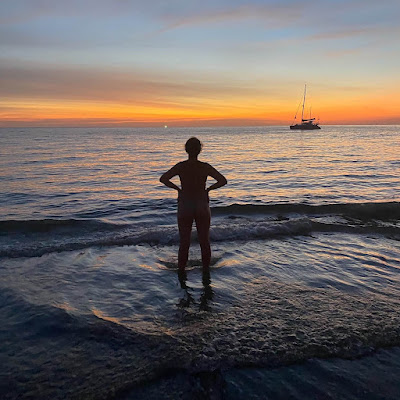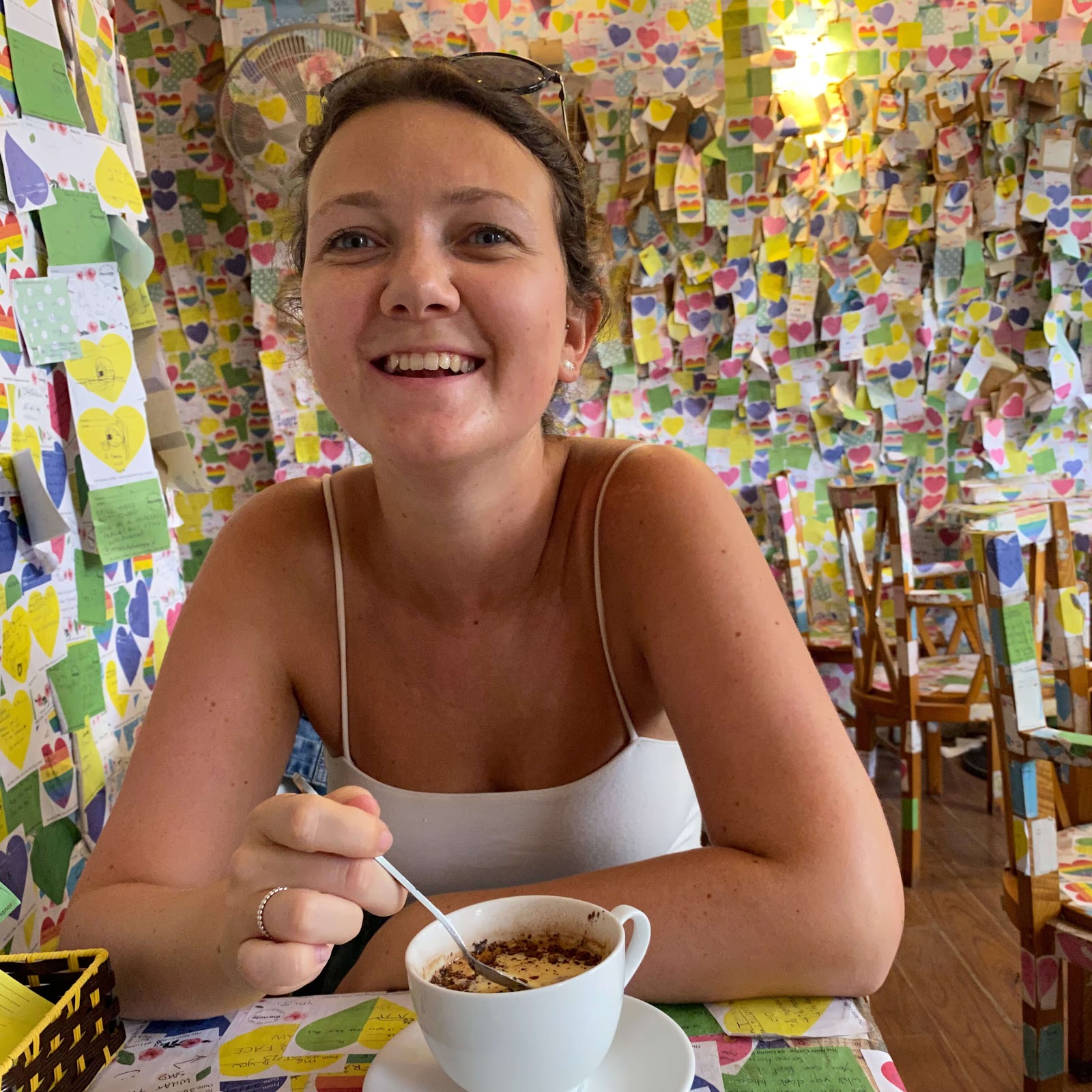Where To Spend Money When Booking Your Next Travel Trip | AD
Travelling with your partner long-term: my top tips
Well hello to you my reader chums! Travelling is my favourite thing in the world and doing it with my partner makes it extra special. I love how we're able to experience new things together such as trying new foods, seeing new sights or learning about different cultures. Travelling long-term is a blessing but completely different from going on a week-long holiday with your partner. You're with each other 24/7, experience unique things together and see the highs and lows of the travel way of life.
If you're heading on a backpacking or long-term trip with your partner, here are my best tips on how to travel with your partner.
Check-in with each other regularly
Checking in with emotions is incredibly important every day, especially when you're roaming around a new place and faced with different challenges. Also with travelling, it can be tiring and overwhelming and it's important to recognise that. What my partner and I did every day was a check-in each morning. We rated how we were feeling in terms of mood and energy out of ten as it gave us both an indication of where we were at for the day. And, if both of the scales were low, it opened up the conversation to talk about how and why we were feeling that way.
Give each other space when possible
When you're travelling with each other 24/7, it can be hard to give each other your own individual time and space as there's no room for it. However, there are ways around this. For example, if one of you wants to sit and watch something on their phone or take some time to journal quietly, respect their wishes. Or if they simply want to be with their thoughts. Give each other the space and energy to do the things they like on their own accord, even if you're still in the room with them.
Compromise on your plan
A relationship is all about compromise and when travelling with your partner, it's the same premise. You should compromise on your itinerary overall when planning the trip, and the every day once you're there. This can include where you want to go to eat, when you need to rest and the order you want to do things that day. Communication is key to compromising as you can come to a conclusion with what fits you both.
Never abandon each other
You are a team, first and foremost and that means never abandoning each other. You can argue and disagree but never leave as you should stand by each other on your trip. When my partner and I were low energy or tired, we'd bicker a bit here and there, and that's normal. But we always knew we had each other and it was just a little bicker.
Always be open to talk
As I mentioned, communication is vital in a relationship and especially when with each other 24/7. You need to have an open mind and want to talk things through, the good and the bad, at any point in the day. If you're not feeling up for talking at one point, acknowledge this and say you'll speak about it later.
Be self-aware of your emotions
Self-awareness is something we should all strive to improve on as it helps you recognise your own feelings and emotions and how you're projecting that in a situation. Being self-aware when travelling is really useful in helping to communicate with your partner effectively, and support each other.
Know each other's boundaries
Understanding boundaries can help you both flourish on your travels. You'll both have different boundaries, whether that's having some alone time or not pressing when your partner doesn't want to talk. Boundaries can vary but knowing what your partners are can help you make effective decisions, and aid you in growing together.
Love and appreciate every moment
Travelling is phenomenal and a wonderful experience to enjoy in a partnership, whether it's a backpacking venture or a luxury cruise ship. Whatever the destination, remember to capture every moment and cherish it. Be present in what you're experiencing, focus on your quality time together and fall in love with your adventure. I can assure you travelling with your partner will help you flourish and thrive as a couple.
I hope you enjoyed this post! What else would you add?
Thank you for reading <3
The best experiences in Sri Lanka
Well hello to you my reader chums! I fell in love with Sri Lanka for many reasons; the friendly and wholesome people, the natural scenery, the sights and the phenomenal experiences. I've been wanting to visit Sri Lanka for the longest time and after two weeks backpacking around the country, I can say it lived up to every high expectation.
If you're planning a trip to Sri Lanka and unsure what to do, here are the best experiences I had in Sri Lanka.
Book review: The Paris Apartment by Lucy Foley
Top apps to download for backpacking Southeast Asia
Well hello to you my reader chums! Reminiscing about Asia is in my mind constantly, I miss everything about the backpacking trip. I would love to be back travelling around in tuk-tuks, eating street food and seeing new places.
When I was travelling, there were many apps which made it easier to navigate my partner and me around, providing us with definitive answers to new places and experiences. If you're backpacking around Southeast Asia, these are the top apps to download.
Booking.com
I've been using Booking.com for years as it's my favourite website to book accommodation and find really good deals. As I use it so frequently, I often get discounts and therefore, save a lot of money overall which helped massively with booking accommodation for this trip. Booking.com is great in general as it's easy to filter through and see exactly where accommodation is in conjunction with where you're going.
Post Office Travel
Backpacking undoubtedly means lots of different currencies across the course of your trip and getting used to new exchange rates. I found Post Office Travel to be useful for all of my travels and it came in handy also for this backpacking trip. Although it didn't have all currencies on, it did have some and allowed me to load on money and take out when I pleased. This also helped as it meant I had another card with me.
Maps.Me
This is a genius app we found before the trip and I'm thankful we both downloaded it because the app was incredibly useful. Maps.Me allows you to download maps from any destination all over the world and it provides information on restaurants, cafes, tourist sites and more. The maps also have random commentary on plenty of places where people have added something to the map. It's a collaborative thing, meaning any user can add a location to the map. That's what makes the maps incredibly accurate and useful.
Rome2Rio
When it comes to planning routes or transport, Rome2Rio is useful as it shares the possible ways to get from location to location. For example, you can fly, take a train or bus and it'll list out the cheapest and fastest routes.
12Go
To book transport, this app is the go-to. 12Go provides options for bus, train, boat, taxis and flights, to help you make the best decision for you. I booked plenty of transport via this app as it was incredibly cheap, easy to use and effective.
Easybook
When I couldn't find transport on 12Go, another app which was incredibly useful was Easybook. I particularly found this helpful for booking buses in Malaysia as there were plenty of options. Although, with Easybook, it's not always clear on the location point of where you need to catch a bus.
Klook
I always say when backpacking Southeast Asia, it's better to book excursions and tours whilst you're there because it's usually cheaper and more convenient. However, for the tours or sometimes transport I didn't book in person, I found Klook to work wonders in finding amazing and inexpensive tours. Every tour we did here was brilliant with clear communication and honest reviews, making it easy to pick the right things for us.
Grab
Taxis are an inevitable part of getting around when backpacking, especially when you're transporting your backpack. To keep things cheap, Grab is handy to have as often taxis are reasonable and the experience is great. If I wasn't using a tuk-tuk, I'd always go on Grab! Although be aware, Grab isn't available in every region across Southeast Asia.
FlexiroamX
It's no myth that data is expensive abroad, and instead of buying a sim card at every destination, download Flexiroam. This app allows you to buy sim cards for data purposes worldwide and has an easy-to-use guide on how to install them. They have data plans ranging in the amount of data and length of time, from a couple of days to a month long.
Google Translate
Unless you're a language queen, being able to speak multiple languages across Southeast Asia is tricky and why Google Translate can do wonders. If you download the languages you like, you can also use it without the Internet. The app can be helpful when you need to translate the menu or talk to a local who doesn't speak English.
Books/podcasts
Entertainment is key when you're travelling around on buses, boats, trains and planes. As you can't bring lots of books with you, downloading the book app and podcast app allows you to read lots of books and listen to many podcasts.
I hope you found this post helpful. What other apps would you recommend?
Thank you for reading <3
How to deal with post-travel depression
Well hello to you my reader chums! 'Post-travel depression' is something I dealt with before the first time I went backpacking and this time, I was really worried about coming home and adjusting to life again. It's a complete change from doing exciting things every day to reality and everyday life. I'm grateful for my life at home and I love it, but the adjustment period was hard.
If you're backpacking and heading home soon or just got home from a long trip, here are my best tips on how to deal with post-travel depression.
Take it easy on yourself
The transition from travelling for a long period of time to regular everyday life is a tricky one. When I came home, as happy as I was to be reunited with everyone I loved and my home, I had this sad sense of missing the freedom travelling brings. I missed the food, the new sights every day and the freedom of roaming around with no set plan. I missed how I had no responsibilities and could travel with ease. These thoughts really hit me and I was incredibly hard on myself about needing to snap back to normal life and doing a million things at once. You don't need to do this - take things slow and be kind to yourself. Gradually get things back to how your life was and how you want it to be now as you've settled back home.
Build a routine
Routines are a blessing and can do wonders when you're adjusting back home. I found this to really help me get back to normal and fulfil a purpose each day. When I'm feeling down, it can be hard to want to do anything and implementing a routine, gave me a focus, plan and purpose. I got back into reading every morning, doing pilates and listing tasks I needed to do each day.
Connect with loved ones around you
The best thing for me about returning home was reuniting with my family and friends. Seeing the smiling faces of them all and speaking in person was wonderful, and one of the reasons, it made dealing with post-travel depression easier. If I was having a hard day, I could talk to one of them and they'd offer me love and reassurance. I'd recommend putting dates in the diary before you return home to when you're seeing people because it'll give you something exciting to look forward to on return.
Seek out your hobbies again
Hobbies are one of the things which make home life so wonderful as it's a chance to embrace passions and what you love to do. I tried to get back into this straight away as it allowed me to explore my other hobbies that weren't travelling. I got back into reading, baking, cooking and no doubt, writing.
Avoid putting pressure on yourself
It's easy to become your biggest self-critic, especially during a period of change. I found I put way too much pressure on myself to build up my freelance work, socialise with everyone and be the best person in normal life, and I didn't allow myself time to ease into things and enjoy the little parts of being back. Take things slow, listen to your mind and body - and focus on yourself.
Find a new focus
For anyone travelling for a long period, that has been your focus for a long time. It would have been your focus before you went to plan and save for and whilst you're in the midst of it, all you're thinking about is travelling. With that in mind, when you're home consider a new focus to put all your energy in. This could be finding a new career, delving into a new hobby or a fitness goal. It doesn't have to be anything too massive but something that you enjoy. For me, it's building my freelancing business and striving to make it a sustainable success.
Cry if you need to - feel all of those emotions
Post-travel depression undoubtedly means you'll experience lots of emotions, including feeling sad and depressed. Don't be afraid of it, if you're feeling sad or down, have a cry. Release all those emotions and allow yourself to process them. If you bottle them up, it'll be worse for you in the long run. I've cried a lot in the first few weeks of being back for many reasons and that's okay.
Plan your next adventure
If you're like me and came back quite broke, this will be the last thing you want to think about as you can't afford to do it. However, having a goal of where you want to go next, whether it's in a month's or year's time will give you incentive to work towards your goal. I have many ideas of big adventures I want to do, from mini trips to longer trips and I'm working hard to save up enough to make those dreams a reality.
I hope you enjoyed this post! What other tips would you add?
Thank you for reading <3
Everything to know before backpacking Asia
Well hello to you my reader chums! Backpacking Asia for the second time was a dream come and honestly, as I've mentioned in previous blog posts, one of the best life experiences to date. I miss the dreamy sunsets on the islands, the chaos of city life and seeing gorgeous historic temples, as well as friendly locals smiling in the streets.
If you're planning a backpacking trip to Asia across multiple countries, here is everything to know before backpacking Asia.
Paying with cash is the norm
In the UK, using cash seems awfully unnatural but across most countries in south and southeast Asia, it's the norm. Don't expect to walk into restaurants and cafes, especially ones run by locals and be able to pay with a card. Most of the time it's cash or there will be a charge on your card. It's best to bring a suitable amount of cash with you or draw it out at the ATM. Due to ATM charges, I'd recommend getting the highest amount possible to save you keep paying additional charges.
Eating street food is a right of passage
Street food is just a dream! Whether it's pad Thai in Thailand, fried noodles in Malaysia or banh mi in Vietnam, locals know how to cook good food for a very cheap price. Often street food can range from 50p to £3 at most, depending on the country you're visiting of course. It's incredibly cheap but also beautifully full of flavour. I have to admit, I've eaten better food in Asia at street stalls than from restaurants.
English is commonly used in the most popular areas
I say this with any country you visit, it's always best to learn a few greeting phrases to help you travel around and honestly, it's polite for locals who live there. However, English is widely spoken across Asia and in some countries that mean fluent and in other countries, it can mean on a more basic level. It depends on where you are and who you speak to really. For example, a person working at the hotel is more likely to speak better English than someone living in a rural community as they'll need it for their job. Be mindful of people's language barriers and if in doubt about communication, you can always type it in Google Translate.
You'll need to follow the rules of the land
Every country has different customs, laws and rules you will need to follow. Before you go, do your research on the specific destination in Asia and what the laws of the land are. For example, in countries which are heavily Muslim, be respectful and dress appropriately.
Most toilets are holes in the ground
I don't think I'll ever get over holes in the grounds as toilets but I definitely had to get used to them. It was almost refreshing when you'd find an actual toilet to sit on! As most toilets are holes in the ground, you'll need to get used to going to the loo that way and flushing it with a bucket of water, rather than a typical flusher.
Always carry tissues and hand gel
Because of my previous point, I cannot stress this enough. Most toilets do not have toilet rolls and sometimes even soap which is why you need to bring your own. It's the more built-up places that do provide these things, however, in more local and off-the-beaten-path areas, you won't find this. Always pack tissues (and throw them in a bin, not the loo) and hand gel to keep yourself feeling comfortable.
Dress appropriately for religious sites
Backpacking will undoubtedly involve visiting many religious sites from Buddhist temples to mosques and due to this, you need to dress appropriately. Some religious sites provide sarongs or scarves to cover up with, however, most don't or you need to hire them when you're there. I'd recommend investing in a sarong before you leave as I can assure you, it'll come in handy a lot when visiting these sites, especially if that day you're wearing shorts due to hot weather.
Haggle costs for tuk-tuks and market stalls
People will love to try and con you out of your money, getting you to pay more because they can as you're a tourist. To avoid this, try and haggle the costs down to what you want to pay. Most of the time, what they're trying to charge you isn't the actual price, and you can try and lower it as much as you can. For tuk-tuk rides especially, agree to the price before you get in, otherwise, they'll charge you more.
Book excursions/tours when you're there
Life in the south and southeast Asia is chill; there are always excursions available and most things are very unlikely to book up in advance. I'd therefore recommend booking tours and excursions as you're travelling around as they'll often be cheaper and plans may change. Plus, many online websites do charge a lot more to make money. I will say, one website which we found to do very similar prices to local travel agents is Klook. And quite often, they'd have discounts if you had an account with them.
Always ask for no spice if you don't want spicy food
Asian food across a lot of cultures can tend to be quite spicy and if you're not a fan of spicy food, simply ask for less or no spice. Most often, they can amend the dish but if it's not possible, they may recommend something else. I even had a lovely restaurant owner remake my whole dinner as it was too spicy and didn't charge me for two meals - it was the kindest thing.
If a menu doesn't have vegetarian options - ask
Some Asian cuisines are heavy on meat dishes such as Vietnamese or Malaysian. However, there are usually ways they can make it veggie such as swapping out meat for tofu or just using vegetables. If there isn't an option on the menu, ask if they'll do it vegetarian and most of the time they say yes.
Alternative milk isn't everywhere
The last time I went travelling it was not something I noticed as I still drank dairy milk, but this time I did as an oat milk drinker. Most local places don't have milk alternatives, it's only in the more touristy cafes and restaurants you'll find this. Due to that, you'll have to drink your coffee/tea black.
Island time is a thing (as in things are always delayed)
Sometimes island time can be convenient, and other times, it's annoying. They don't work on the same quick and to-the-book schedule as we do in the UK across many parts of south and southeast Asia. Buses, trains, tours and excursions for example are commonly delayed or not on a particular schedule. The term 'Island time' is thrown around a lot on the Thai islands and any beach location in Indonesia for example. But this way of life is also common on the mainland. We had a car excursion booked from one location to the other which was meant to take 8-9 hours and took 18. My advice to you is, don't book things to the minute.
Things won't run as smoothly as your itinerary
This leads me to this point - avoid booking things so tightly as you don't know when things will and won't go to plan due to delays and the chill pace many locals do things. Allow time for this, even if that means booking an extra day or a later flight for example. We were lucky only minor things went wrong and not many things affected our itinerary.
Bring suncream with you
If there is one thing you need to overpack, it's sun cream! Sun cream across Asia is not only expensive (talking UK brands here), it can do the opposite of what you need. Many localised sun creams contain bleaching agents in them to whiten your skin. This is why I would say if you are going to buy suncream out there, you will probably only find it in heavily touristy areas and expect to pay a lot more for it, for smaller bottles.
Clothing is only available in smaller sizes on market stalls
I'm going to admit here that backpacking isn't catered for curvier or plus-size people, especially when it comes to buying clothes. The 'backpacker elephant' trousers you see everywhere are typically in one size and that size is on the smaller end of the scale. I'm a size 10 and they fit me and I didn't see many that were often bigger than that. Even with larger tops, they're not necessarily the size large we would expect in the UK.
Download FlexiRoam for data use
To save yourself buying a sim card at every new location, download the app FlexiRoam. I originally found this on Tik Tok, but it basically allows you to buy an e-sim for all the locations you're going to, providing access to data wherever you are. It isn't that pricy either and there are options for 1 day to month-long sim cards. It's also easy to install as you just follow the steps on the app.
Be wary of monkeys
We may have pigeons and seagulls but in many warmer Asian countries such as Sri Lanka, Indonesia and Thailand, they have monkeys. Be wary of this across many areas and look after your belongings. Monkeys will take anything, especially food and also, don't look monkeys in the eyes as they get intimidated. We had no mishaps with monkeys but I did see a tourist or two behave silly around them. They're wild animals at the end of the day.
Do your research on scams for each country
Scams are everywhere and it can be easy to fall for them as you naturally sympathise with people poorer than you. But, don't get caught out, use your initiative and be stern. You don't have to give people money even if they persist. Just walk away with your head held high.
Pack light - you can buy most things
Backpacks are heavy, especially when you're carrying them to walk somewhere. With that in mind, pack light. You really don't need as many things as you think you do. Pack what you need and half it. On this trip, I actually used everything I brought, whereas the trip before I packed way too much and my backpack was too heavy. The best thing is to pack versatile pieces that layer as it'll always feel like you've got a new outfit.
Have money for emergencies
You never know when you'll be caught out or if there will be unexpected costs. And that's why it's important to have a safety net of backup money. As for us, we had to pay for hospital care for the motorbike accident, the Philippines was doubly more expensive than we expected and we wanted extra souvenirs along the way.
Local food is always best
Food is dreamy as you backpack around Asia and I can assure you, you'll miss the flavours when arriving back home. The best food is always from the locals as they cook with passion and tradition.
I hope you enjoyed this post. What other tips do you have?
Thank you for reading <3

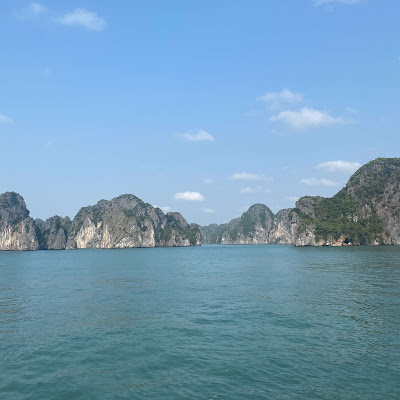
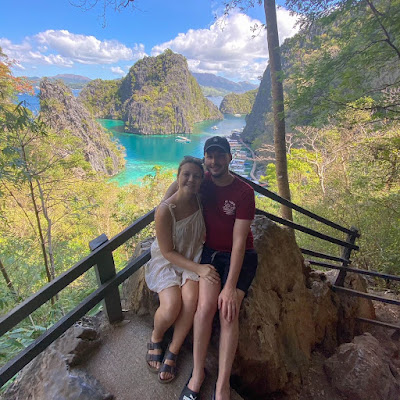


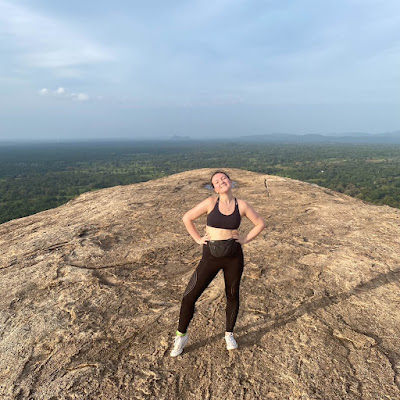

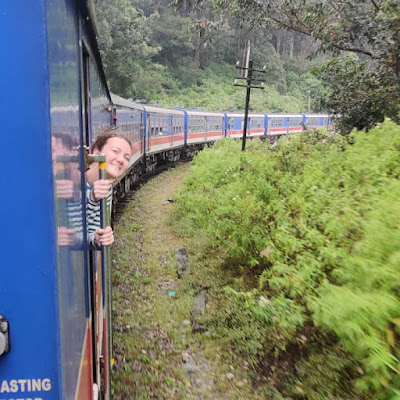

.jpg)

